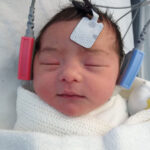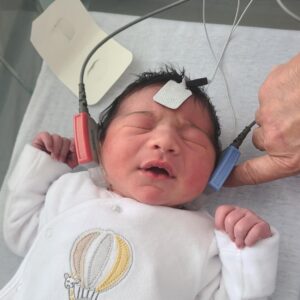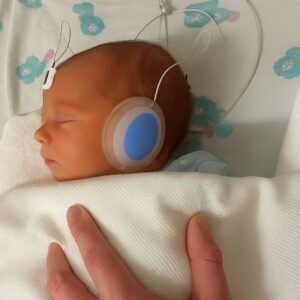As part of the NHS Newborn Hearing Screening Programme, all of Forth Valley’s newborn babies are offered a routine hearing screen.
 The screening is usually done within the first few days of life and most likely before the baby leaves the maternity unit.
The screening is usually done within the first few days of life and most likely before the baby leaves the maternity unit.
It is a very quick test, which is done by a trained hearing screener while your baby is asleep. The screener uses a machine to measure how your baby’s ears are responding to sounds, which are presented via little headphones. Your baby will not be uncomfortable at any stage of the testing. No anaesthetics are used and you will be able to stay with your baby. You will be given the results immediately, verbally and in writing.
Follow-up screening appointment
If we do not obtain a clear response from this first screening test, then this does not mean your baby has a hearing loss. There are many other reasons why your baby might not have passed. Mostly this is due to the baby’s ears still being wet from delivery, but perhaps your baby would not settle or the test conditions were not ideal. You will be offered a follow-up appointment for your baby to be retested. This retest may be carried out before you leave the maternity unit or once you are home.
Being referred to Audiology for further testing
Many babies need to be referred to their local audiology department for further testing for a number of different reasons. It might be that we need more detailed information about their hearing because their first two screening tests did not show a strong enough response. Being sent for further tests does not always mean that your baby has a hearing loss although there is the possibility. The Audiology assessment is called Diagnostic Auditory Brainstem Response (ABR).
Why does my baby need to attend the Audiology department?
Your baby’s AABR screening tests did not show a clear response. This is common and might be due to:
- your baby may have been unsettled during the screening test
- your baby may have had mucous or fluid in their ears
- The room may have been noisy when the screening test was carried out
- your baby may have hearing loss in one or both ears
Audiology clinics have special equipment to test your baby’s hearing. These tests will give more detailed information about your baby’s hearing. Around 1 or 2 babies per 1000 are born with a hearing loss.
What is the likelihood of my baby having a hearing loss?
Most babies tested at an audiology clinic are found to have satisfactory hearing, but about 1 in 20 babies tested at the audiology clinic will have a permanent hearing loss in one or both ears. Early identification and management are known to be important for the development of the child. It also means that support and information can be provided early.
Do I need to take my baby for further assessment if they seem to be responding to sounds at home?
 Yes, it’s very important that you keep the Audiology appointment, because babies who have a hearing loss will usually still respond to some sounds. If your baby does have a hearing loss, it’s important to find out as soon as possible. The hearing loss may not be picked up without the tests in audiology.
Yes, it’s very important that you keep the Audiology appointment, because babies who have a hearing loss will usually still respond to some sounds. If your baby does have a hearing loss, it’s important to find out as soon as possible. The hearing loss may not be picked up without the tests in audiology.
Some babies have a temporary hearing loss. Finding out about hearing loss early gives babies a better chance of developing language, speech and communication skills as well as making sure their families receive the support they need.
It is important you bring your baby to the appointment. This is because they may need other tests to find a possible cause if they do have a hearing loss. These tests should be performed within the first few weeks of birth.
What do I need to do before the audiology assessment?
- Try not to let your baby sleep before the appointment
- Bring an extra feed in case you need to feed your baby during the audiology appointment
- Bring everything you need to make your baby comfortable and happy.
What is the Diagnostic ABR?
This test is commonly offered to babies if they have not passed the Automated ABR (AABR) screening hearing test. It is a more complex, non-automated version of the AABR.
During the Diagnostic ABR assessment
Testing may be carried out in a quiet darkened room and it is essential that the baby is asleep for this test, so please do not bring any other children to the appointment, as this might provide unwanted distractions. The appointment will usually take 60-90 minutes, but occasionally longer. This includes time to settle your baby. The assessment will not hurt or harm your baby. You may wish to bring someone with you and you will be able to stay with your baby while the assessment is carried out.
The Diagnostic ABR assessment is carried out by an experienced, specially trained Audiologist (an audiologist is someone who specialises in hearing) using specialised equipment to more accurately measure your baby’s hearing function. Sensors placed around the baby’s head detect information, which passes along the auditory nerve to the Brainstem. This information is then interpreted by the audiologists.
Once your baby is asleep, some chirping sounds are played into your baby’s ears through small inserts placed into your baby’s ears. Regardless of previous results, both ears will always be tested. The audiologist will carry out the diagnostic assessment and a computer is used to measure how well your baby’s brain responds to sound. This assessment will give more detailed information about your baby’s hearing, but sometimes more than one appointment may be required to gather all the results.
As well as the hearing assessment, we may ask your permission to carry out other screening tests, for example you may be asked to provide a sample of urine from your baby during this appointment. The audiologist will help you to collect this.
What will happen after the test?
After the test, your audiologist will be able to give you the results (if known), or rebook your baby for further testing. If you have any concerns about the results, or you have any questions, contact the audiology clinic.
Your baby’s hearing may also be assessed using Otoacoustic Emissions (OAE), which is an automatic test of cochlear (ear) function. A small insert is placed in your baby’s ear and a computer measures the responses to the clicking sounds, which are presented.
Please see our tests page for more information about individual tests.
What does ‘satisfactory results’ mean?
If you are told your baby has satisfactory hearing, this means they are unlikely to have a hearing loss. Your health visitor may be able to provide you with a checklist. If you have any future concerns about your child’s hearing, discuss them with your health visitor or family doctor, who can arrange for another referral to Audiology for hearing assessment. Your child’s hearing can be tested at any age.
What if the assessment does not show satisfactory results from one or both of my baby’s ears?
 If the Audiology assessment does not show satisfactory results from one or both of your baby’s ears, your audiologist will explain what the results mean. Further tests may be required before you will know more about your baby’s hearing. There are different types and levels of hearing loss. The results of the assessment carried out at the Audiology department will help ensure that you and your baby receive the right support and information. Early testing means you will know if your baby has a hearing loss while they are still very young. This is important for their future development, giving your baby a better chance of developing spoken language.
If the Audiology assessment does not show satisfactory results from one or both of your baby’s ears, your audiologist will explain what the results mean. Further tests may be required before you will know more about your baby’s hearing. There are different types and levels of hearing loss. The results of the assessment carried out at the Audiology department will help ensure that you and your baby receive the right support and information. Early testing means you will know if your baby has a hearing loss while they are still very young. This is important for their future development, giving your baby a better chance of developing spoken language.
Follow up testing
Some babies need to have a further follow up hearing test when they are a little older. This might because they were required to be given strong medication at birth or perhaps they have a syndrome or condition that puts them at greater risk of developing a hearing loss. You will be told if your baby requires this follow up testing. Your appointment is generated automatically between 7-12 months of age, so it is important that you keep us informed of any change of address details.
Further information
What? Why? Children in Hospital (WWCIH) have produced an educational video of the diagnostic ABR: My baby has a hearing test in hospital – What Why Hospital For Children
This was filmed with our Audiology colleagues in the Royal Hospital for Children, Glasgow, but will be very similar to a diagnostic ABR appointment in NHS Forth Valley.
NHS Scotland together with Public Health Scotland have produced an information leaflet on Newborn screening tests – Your Baby – Tests Offered.
More information and leaflets can be found on the Websites of The National Deaf Children’s Society, the NHS website and Screening Scotland Newborn Hearing Test.
If you still have any questions, you can email the Audiology department directly at fv.audiology@nhs.scot

